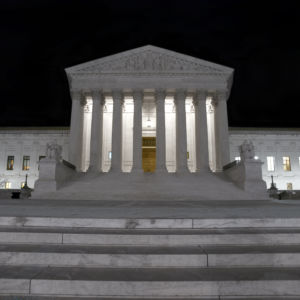How much can a Supreme Court ignore public opinion in a polarized nation? With the nomination of Brett Kavanaugh to the Supreme Court, that question has become more pressing. Assuming he’s confirmed, a court with Justice Kavanaugh rather than Justice Anthony Kennedy is going to be more conservative, but not much more. While it’s possible that some long-standing precedents are on the chopping block, our current political polarization will help stay the court’s hand from being too disruptive.
Supreme Court justices understand the somewhat precarious place the court inhabits in our constitutional system. If its judgments are to be enforced, the court depends upon respect from the legislative and executive branches and broad support from the public. In the words of Alexander Hamilton, writing in the “Federalist Papers,” the judiciary has neither “the sword or the purse” and it “must ultimately depend upon the aid of the executive arm even for the efficacy of its judgments.”
Throughout American history, Supreme Court justices, and particularly chief justices, have been sensitive to public opinion. While many would argue they shouldn’t be, the court ignores public opinion at its own peril. Without sword or purse to enforce its rulings, how will the people react if a Supreme Court decision undermines their deeply held convictions?
That question was put to the test in 1954, when the Supreme Court decided the landmark case of Brown v. Board of Education and all hell broke loose. America was polarized then too, with the Southern states being much more in favor of segregation than the Northern ones. When the Supreme Court announced its ruling, the resistance began almost immediately. Gov. Orval Faubus of Arkansas called out the Arkansas National Guard to help block nine African-American children from entering a high school. In response, President Dwight Eisenhower sent the 101st Airborne to Little Rock to escort the children into school. It was a true constitutional crisis, the likes of which had not been seen since the Civil War.
Chief Justice Earl Warren was aware of the dangers of striking down school segregation. Fearing that any dissenting vote would embolden a resisting South, Warren worked behind the scenes with Justices Hugo Black and Felix Frankfurter to ensure a unanimous ruling. Warren visited Justice Robert Jackson in the hospital, where he was after suffering a heart attack, to persuade him not to file a separate opinion. Only Justice Stanley Forman Reed was left, and Warren told him,. “Stan, you’re all by yourself in this now.” Reed ultimately joined the opinion, and Jackson left the hospital on the day the opinion was announced so the court could present a united front.
Like Earl Warren, Chief Justice John Roberts is deeply concerned with his court’s respect and legitimacy. His crucial vote upholding the Affordable Care Act can be seen in that light, as can his numerous opinions seeking to unite the broadest consensus of justices on the narrowest grounds. In doing so, he often crosses ideological lines, as he did this term in Carpenter v. United States, when he was joined by the four “liberal” justices in striking down the warrantless acquisition of cell-site location data.
If confirmed, Justice Kavanaugh is likely to have the same concerns as Roberts. Like Roberts, Kavanaugh has had a long career in high-level Republican legal positions. He is a consummate insider, and he understands the political game needs to be played with honor and due respect for our constitutional system.
That respect entails understanding the difficult job Congress has been given, especially in our polarized political climate. Cobbling together legislative fixes to our myriad problems takes a lot of time, and a Roberts Supreme Court with Justice Kavanaugh is unlikely to disrupt Congress’s work unless the Constitution clearly requires it.
The same goes for contentious social issues like abortion and gay marriage. The court will not undo its 2015 gay marriage decision; it’s simply too disruptive to invalidate hundreds of thousands of marriages, if not more, as well as to throw into chaos tax statuses, property ownership and inheritances. Similarly, a decision overturning Roe v. Wade would significantly shift public opinion against the court — 57 percent currently support legal abortion.
Neither Chief Justice Roberts nor a Justice Kavanaugh wants to see the Supreme Court’s approval rating reach Congress’s low levels —18 percent in April. While Congress can weather such abysmal numbers, such broad disapproval would do lasting damage to the court, and that’s a legacy no one wants.

